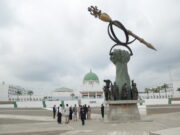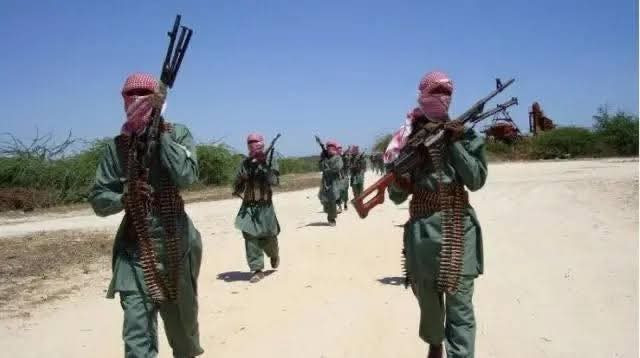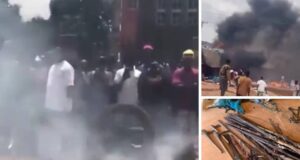A deadly new militant group known as Mahmuda has emerged in North Central Nigeria, unleashing terror across rural communities, particularly those around the Kainji Lake National Park.
The group on Thursday killed over 15 vigilantes and civilians in Kemanji, a village in Kaiama Local Government Area of Kwara State.
The group’s reach spans multiple local government areas, including Kemaanji, Tenebo, Baabete, Nuku, and Nanu in Kaiama LGA and villages within Yashikira District in Barutein LGA—all in Kwara State.
Their influence also extends to Babana and Wawa districts in Borgu Local Government Area of Niger State.
Sources confirm that the Mahmuda group, led by an individual whose voice note has been circulating among local communities, threatens residents, kidnaps people for ransom, and carries out deadly attacks without resistance.
“They called themselves Mahmuda group. Their leader in a voice note is threatening all the communities. They kill and kidnap victims and also demand ransom,” one source told newsmen.
Another added, “The surge of insecurity in Nigeria has been a source of concern to the citizenry because of its destructive factor to livelihood, and unfortunately, new militant groups continue to emerge and occupy the ungoverned spaces in the country.”
“With the Kainji Lake National Park left unguarded, the loggers, fishermen, and hunter groups take the opportunity and start enjoying the common good of the citizens for their personal gain.”
Initially, there were conflicts between the militants and local loggers, hunters, and vigilantes.
However, reports say that loggers eventually negotiated with the group, allowing them free access to the forest for tree harvesting, which has also become a financial lifeline for the militants.
“Currently, the community of Kainji National Park (KLNP), which includes Kaiama LGA (Kemaanji, Tenebo, Baabete, Nuku, Nanu) and Barutein LGA (villages in Yashikira District that share a border with the park), all in Kwara State, part of Babana and Wawa District in Borgu LGA in Niger State, have been under siege for years, and the world does not know what is happening to the Borgawas (Borgu people),” another source stated.
The group’s occupation dates back over five years, beginning with the expulsion of park rangers during a raid.
Originally displaced from Mokwa LGA by former Niger State Governor Muazu Babangida Aliyu—who identified them as Boko Haram members—they settled in Welele, Kaiama LGA. Local and security authorities later expelled them again, prompting their relocation to a forest in Kaduna State.
From there, they reappeared in the Kainji Lake National Park, more organized and heavily armed.
“Thus, who are these new militant groups? Some people claim that the militant group came from the Benin Republic or Niger Republic.”
“This claim is also similar to a report from BBC Radio that there was an influx of militant groups to Kainji Lake National Park. Further study of them will reveal the true identity of this faceless group.”
The group has described itself as a moderate Islamist sect in a recent audiotape, identifying as a breakaway faction of Boko Haram, diverging from the Shekau-led wing.
Local recruitment is reportedly on the rise, with many community members allegedly serving as informants.
They refer to themselves as the Mahmuda Group or Mallam Group, led by a man known only as Mallam, said to be promoting Sunni jihadist ideals.
“The militant group mainly speaks Hausa. The saddened reality is that the activities of these militants, controlling a vast territory of 3,970.29 sq. km of the Nigerian state, have resulted in the community members living at the mercy and dictates of the non-state actor. Living at the mercy and dictates of the militants manifests in a number of ways.”
“First, the herders within the park pay dues (zakah) to the militants to allow them to graze their cattle. Second, the farmers to whom the militant allocates farmland within the forest also pay farming levies to the militants. Third, the militants forced the residents to work on their farm as sadaka.”
“Fourth, members of the community are kidnapped and made to pay ransom. Fifth, illegal mounting of roadblocks along the community, and regulating the social activities, particularly the sale of alcohol and all forms of smoking, and even settling disputes among the community’s members.”
“Sixth, the militants threaten the existence of herbalists that they assume are fortifying the community vigilante members to confront them. Unconfirmed reports also have it that the Mahmuda Group or Mallam Group is into illegal mining in the park environment.”
Under the guise of religious messaging, the militants organize gatherings to preach Islamic ethics while subtly encouraging disloyalty to the Nigerian state.
Community members are required to report all disputes to the group rather than recognized authorities.
“The loss of trust in the security agent to address the insecurity challenges in the area makes the vigilante group work hand in hand with the Mahmuda Group to rescue kidnapped victims from the bandits.”
“The group was able to force out all the bandits from the park area, and their collaborators within the communities were kidnapped to their place, and ransom was collected, or those judged to be more involved in the act of banditry were slaughtered.”
The fear among many locals is that such a powerful group operating with heavy weaponry must have tacit support from certain higher powers, although no one can say for sure.
“The assumption among the locals is that the militant group present in the National Park is known to the authority above, but by whom? Guess time will tell.”
“To some, it’s simply because of the sophisticated weapons in their possession, which makes it practically difficult for them to be dislodged from the national asset.”

















